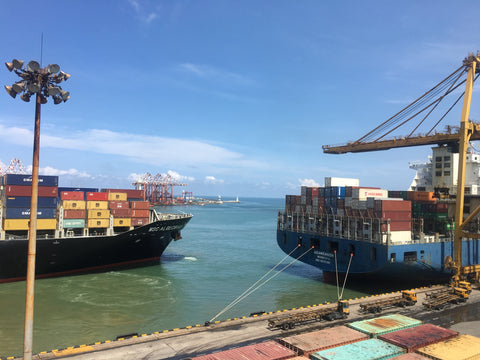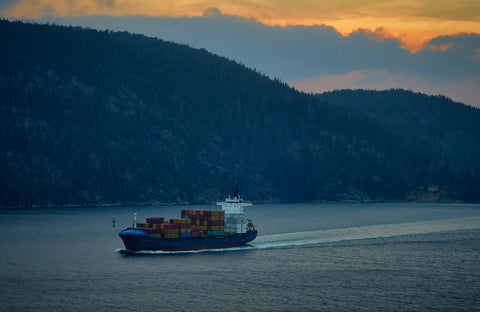More than 90% of the products in world trade are transported across the world's oceans by some 90,000 ships . Like all modes of transport using fossil fuels, these ships produce carbon dioxide which contributes significantly to global climate change and ocean acidification. But it's not just the carbon dioxide these ships release, a handful of other pollutants they generate also contribute to the problem.

Marine Industry Toxic Gas Emissions
Shipping is responsible for a significant proportion of the global problem of climate change. More than 3% of global carbon dioxide emissions can be attributed to ocean-going ships. This is a proportion comparable to that of major carbon-emitting countries, and the industry continues to grow rapidly.
In fact, if global shipping were a country, it would be the sixth largest producer of greenhouse gas emissions . Only the United States, China, Russia, India and Japan emit more carbon dioxide than the world's maritime fleet. According to a study by the International Maritime Organization (IMO) on greenhouse gases (GHGs) dating from 2014, maritime transport emits around 940 million tonnes of CO2 per year and is responsible for around 2.5% of global greenhouse gas emissions. Enough to make your bathing in an ethical swimsuit much less pleasant!
Additionally, there is another huge environmental problem caused by the shipping industry: the amount of dangerous sulfur dioxide (SO2) emitted by ships as they travel from port to port across the world's oceans. Due to industry's use of higher sulfur, cheaper and lower quality fuel oil, shipping accounts for 13% of all SO2 emissions , for only 5% of global demand for oil it represents.
Other forms of pollution caused by maritime transport
It is not just the air that is polluted by the many ships sailing across the oceans. The maritime industry is also the source of other forms of pollution that affect the seas, marine life, and indirectly all those who would like to quietly enjoy their eco-responsible swimsuit in a healthy environment.
Oil pollution
Oil pollution from the shipping industry is considered to be the main reason for the increase in the level of marine pollution. Oil discharged from ships contains dangerous levels of sulphur, heavy metals and other harmful substances. Bilge oil from ships mixes with ocean water, causing severe marine pollution. A faulty engine and poorly done repair work are two potential causes of oil leaks in ships. Ship collisions and accidents also cause oil pollution.
chemical pollution
The release of chemicals from ships into the oceans is another threat that shipping poses to the marine ecosystem. Ships emit toxic chemicals from batteries, dry and industrial cleaning products, chemicals for daily operations, etc., which result in pollution of the waters in which these ships travel, and in which we bathe with our ethical swimsuits . Environmentalists argue that these chemicals pose a huge threat to the lives of sea creatures and life forms.
Ballast water pollution
Large ships use a huge amount of ballast water to stabilize themselves while moving. As these ships travel long distances, ballast water is often filled in one region and discharged to another whenever necessary. The problem is that this ballast water contains microbes and microorganisms in addition to vegetation and other marine animals. Thus, pollution is mainly caused by the displacement of local species and the disturbance of marine life. While vacationers enjoy the sun and their eco-responsible swimsuits on cruise ships, the marine life below suffers from this ballast water pollution. A very good example of such ecological damage is the huge increase in the population of jellyfish in the Black Sea.
The MARPOL Convention to combat pollution from ships
Marine pollution, whether from toxic gases, oil, chemicals, garbage, sewage or food waste that is dumped into the water, is a serious problem that affects the oceans and marine life. In an attempt to curb the problem, the international community has established the International Convention for the Prevention of Marine Pollution from Ships , also known as the MARPOL Convention , which is the main international treaty for the management of waste from ships. ships. For your part, participate in the ecological effort by opting for ethical and eco-responsible swimsuits .



